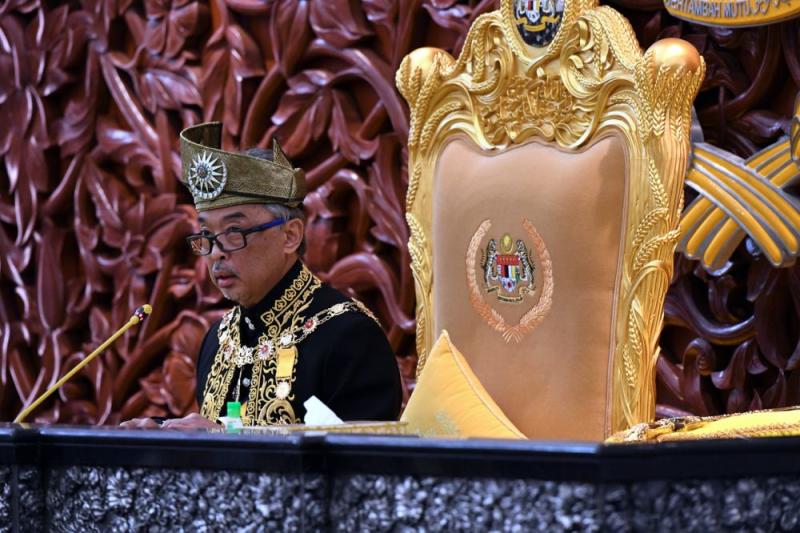SOURCE:
https://malaysia.news.yahoo.com/malaysias-king-upholds-pms-appointment-054446063.html
Malaysia's king upholds PM's appointment as opposition mounts challenge
By Joseph Sipalan
KUALA LUMPUR (Reuters) - Malaysia's king on Monday said the appointment of Muhyiddin Yassin as prime minister during turmoil this year was proper and constitutional, days after parliament put off a vote on an opposition challenge to his leadership.
Muhyiddin's appointment on March 1, at the end of a week of political wrangling that led to the collapse of the ruling coalition, has been challenged by the opposition who say it was not clear that Muhyiddin had majority support from among the 222 members of parliament's lower house, the Dewan Rakyat.
The lower house speaker had initially approved a motion tabled by Muhyiddin's 94-year-old predecessor, Mahathir Mohamad, seeking a vote of no confidence in Muhyiddin, but the vote was postponed indefinitely after the government shortened Monday's meeting, only allowing time for the royal address.
"Surely, every contest will have a conclusion. The country's political wrangling could not be allowed to fester without any end," King Sultan Abdullah Sultan Ahmad Shah said in his address broadcast live on national television.
"Hence ... in line with provisions under the Federal Constitution, I found that Tan Sri Muhyiddin Yassin had the majority support of members of the Dewan Rakyat and was qualified to be appointed as the eighth prime minister," the king said, using Muhyiddin's honorifics.
The king's role is largely ceremonial and it is unlikely his endorsement of Muhyiddin's appointment would have any sway over a vote in parliament on his leadership.
Monday's one-day meeting was the first time parliament convened this year. Its next session is scheduled for July 13 to Aug. 27.
In February, the veteran prime minister Mahathir resigned from his second stint in the job when his coalition collapsed.
Muhyiddin, who had served as home minister under Mahathir, was unexpectedly sworn in on March 1 as the head of a government formed with the support of the old ruling party, that was tainted by corruption accusations and defeated by a multi-ethnic coalition in the last general election in 2018.
Muhyiddin has focussed on managing the health and economic crisis caused by the novel coronavirus.
Malaysia, which imposed curbs on movement and business since mid-March, has reported 6,894 cases of the virus and 113 deaths.
--------------------------------------------------------------------------------------------------------
SOURCE:
https://malaysia.news.yahoo.com/royal-address-agong-reveals-failed-035722311.html
In royal address, Agong reveals failed attempt to convince Dr M against resigning during political crisis

KUALA LUMPUR, May 18 — The Yang di-Pertuan Agong Al-Sultan Abdullah Ri’ayatuddin Al-Mustafa Billah Shah today revealed how he had tried to convince Tun Dr Mahathir Mohamad against resigning during the political crisis in February.
The King, in his opening address of the first meeting of the Third Session of the 14th Parliament, detailed how he found out Dr Mahathir’s intention to resign after consenting to have an audience with the former prime minister on the evening of February 24.
“In that meeting, I had asked Tun Dr Mahathir Mohamad not to resign but he was adamant with his decision.
“Then, I, with a sad heart, I had to agree and respect his decision,” said the Agong during his address this morning.
Following Dr Mahathir’s resignation, the Yang di-Pertuan Agong said he then had to appoint a new prime minister as required under the Federal Constitution — someone who commands the support of the majority of Parliamentary lawmakers.
His Majesty then explained how he then conducted one-on-one meetings with all the MPs, requesting them to nominate a lawmaker as the next potential prime minister, to gauge which leader commanded the majority support of the Dewan Rakyat.
“What is for sure is that every competition will have its ending. The country’s political crisis cannot be left to continue for a prolonged period without an ending in sight.
“Because of that, after going through all the mentioned processes, and in line with the Federal Constitution, I found that the honourable Tan Sri Muhyiddin Yassin commanded the majority support from the members of the Dewan Rakyat and so qualified to be appointed as the eighth prime minister,” said the Agong during his address.
Sultan Abdullah added he remained confident that the administration, led by Muhyiddin, would steer the country to greater heights.
“My advice is to exercise this trust with honesty and responsibility and never ignore the wellbeing of the rakyat,” he said.
Today’s one-day Parliament sitting concluded after the King’s address, with the next session scheduled to begin on July 13.
.

